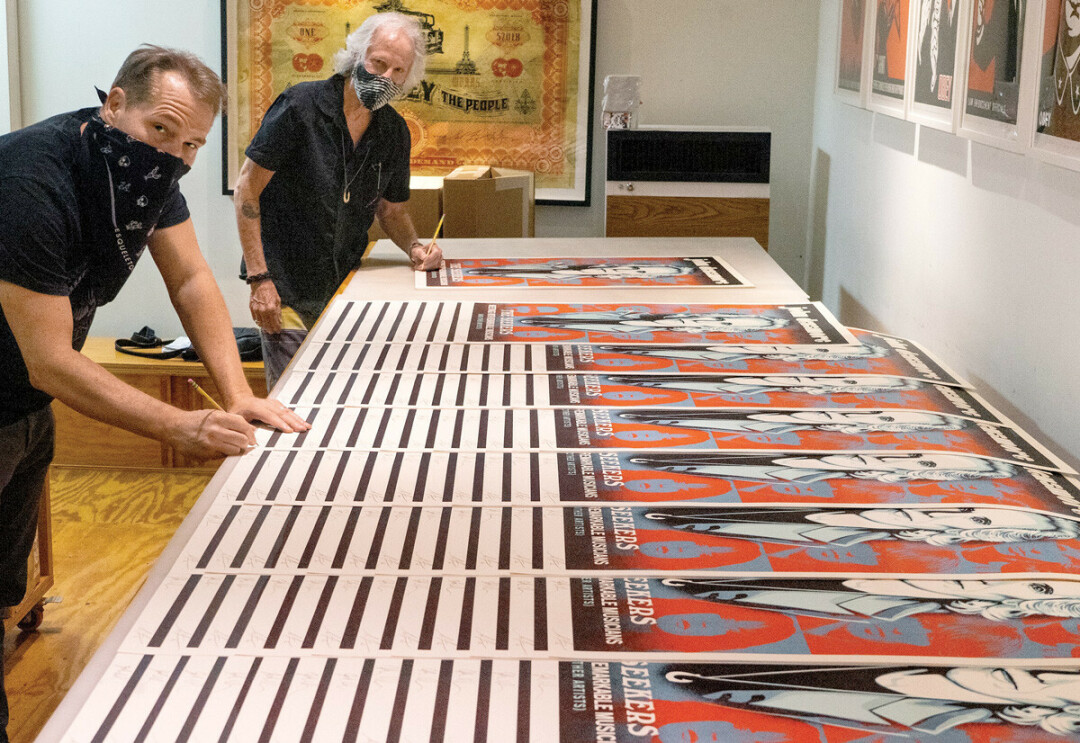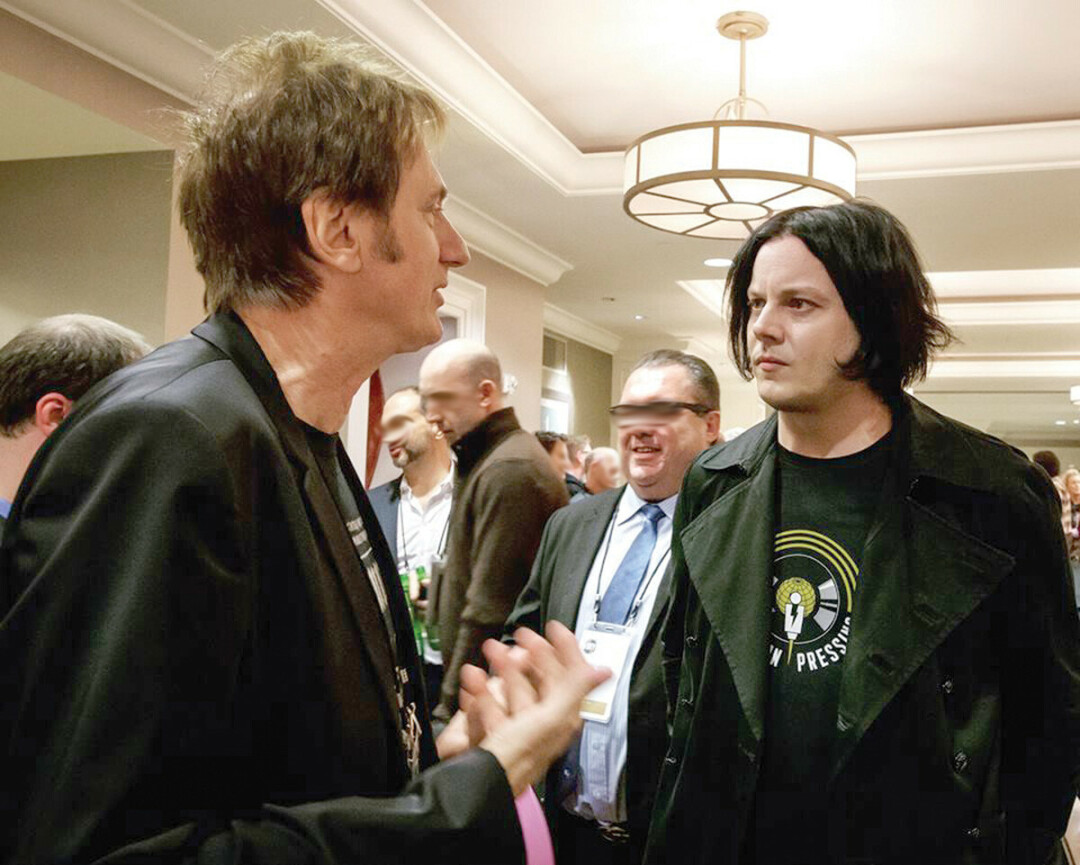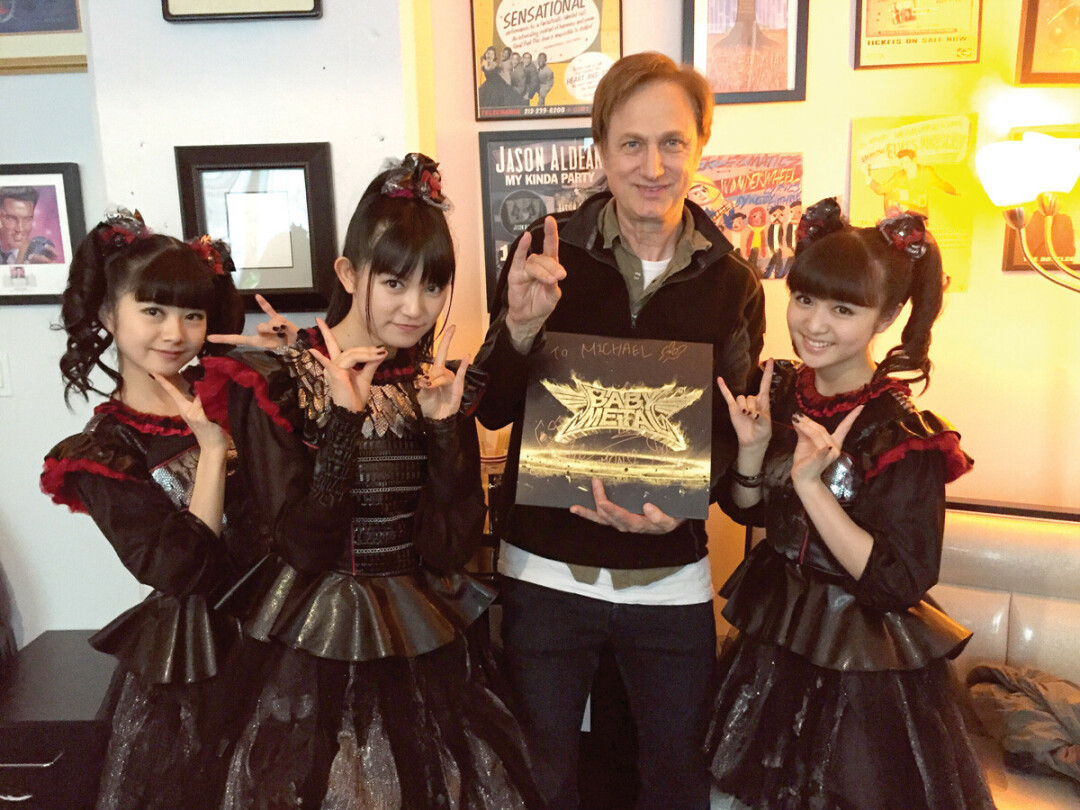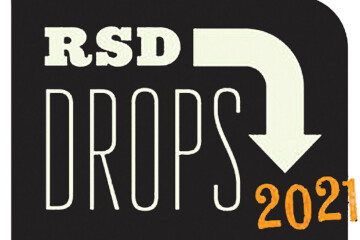An Interview With Record Store Day's Michael Kurtz

Record Store Day is an annual event which began in 2008 and is held on a Saturday every April, as well as every Black Friday in November to celebrate the culture of the independently owned record store. The day typically brings together fans, artists, and independent record stores around the world. Recently we had the chance to chat with one of RSD’s founders, Michael Kurtz, about everything Record Store Day. Here is what we found out.
Brian Ripple: Take us back in time and give us a little background on yourself pre-RSD. What was your life about, before RSD got started?
Michael Kurtz: Not long after 9/11 in 2001, I moved to Brooklyn, NY, and began networking for a coalition of independently owned record stores now called the Dept. of Record Stores, developing strategies to compete with big box stores. Around 2006, I moved to Silver Lake in Los Angeles and began networking with Los Angeles labels and artist managers. I credit this move with making Record Store Day possible as the business environment was totally different in Los Angeles, and I could meet and become friends with folks like The Doors’ drummer John Densmore, Frank Zappa’s wife Gail, and Metallica bassist Robert Trujillo. It was also easier to get a meeting with then President of Warner Brothers’ Records Tom Biery, which is what made Record Store Day happen.
BR: Do you play any musical instruments or ever been in any bands?
MK: After studying music at Appalachian State University and playing in the university big band for a couple of years, I heard R.E.M. in the early ‘80s and decided to drop out and start a band called Three Hits. We got on MTV, signed to Epic and then dropped. There is a Captured Tracks compilation called ‘Strum & Thrum” that just came out and we’ve got a demo track that we did with Don Dixon on that album. It’s kind of like the awesome Rhino ‘Nuggets’ album that Patti Smith Guitarist Lenny Kaye curated back when. I also played in an acoustic band called Semicolon that did a 7” single for Kramer’s Shimmy Disc label and put out a couple of albums. That was all before Record Store Day.
BR: Outside of RSD do you have any other connections to the music industry?
MK: Prior to COVID 19, I helped create the Making Vinyl Conference to establish a strong dialogue as to how we could expand the manufacture and sales of vinyl internationally. We held conferences in Detroit, Los Angeles and in Berlin, Germany.
BR: How and when did the concept of RSD come to life?
MK: Two record store owners suggested to me that independent record stores do something similar to the comic book industry’s Free Comic Day. The Dept. of Record Stores created a music gathering in Baltimore, MD called Noise In the Basement to discuss the idea. We decided that we would throw a party and that vinyl would be a big part of that. After this meeting, I took the idea to Warner Bros. Records’ Tom Biery and he immediately got it and we reached out to Metallica’s management to see if the band would get on board. They said yes and we started planning the release of vinyl records and a big event to celebrate Record Store in San Francisco. The first year we had about 100 stores participate in the USA. After that, I traveled to Europe to meet with organizers at the famous Cemetery of Pere Lachaise where Jim Morrison was buried to plot the spread of Record Store Day throughout Europe. We drank a bottle of wine and now have over 1,300 record stores in the USA and another thousand or more internationally. For me, personally, I knew we’d made it when we got an email from Paul McCartney saying he loved record stores and was behind Record Store Day. Being the big Beatles’ fan that I am, when this happened, I think I floated out of the room; I was in like a balloon. Connecting with the surviving members of the Doors was also a big turning point and I still work with John Densmore on Record Store Day projects to this day. Another big moment is when we were sent a picture of Jimi Hendrix hanging in his favorite Greenwich Village record store the week before ‘Are You Experienced’ came out and then getting permission from the Hendrix estate to make it our official Record Store Day poster. I am a huge fan of Jimi Hendrix, so much so that he used to appear in my dreams all the time as a kid.
BR: When you began RSD what was the main thing you were concerned about, streaming or the corporate box stores?
MK: The main concern at the time was the media portrayal of independent record stores as some kind of benighted community that was too dumb to realize that we were going out of business. At the time, we were having a great time, selling a lot of music on CD and doing a lot of artist in-store events. You just wouldn’t have known it if you read all of the articles about our demise after Tower Records shuttered. We wanted to counter the negative media coverage by throwing this big party. The big box store struggle came before Record Store Day and it was the reason that several coalitions of independent record stores formed across the country.
BR: What was the standard business model for the selling of music at that time?
MK: At the time, practically zero new vinyl was being made for sale anywhere. If you went into a record store, they might be selling vinyl for anywhere from twenty- five cents to a few bucks. It was all CDs.
BR: Walk us through how the RSD team first started getting independent record stores involved. Especially, what was this process like prior to the first RSD?
MK: Essentially, three coalitions of independent record stores formed. There was our organization and the Coalition of Independent Record Stores who remain the best known to this day. And there was the Alliance of Independent Record Stores. We were trying to fight against a system where-in the majors gave large amounts of marketing dollars to corporate stores and they could use them to underwrite selling CDs really cheap, while the independent stores were left to prop up the value of CDs by being forced to sell them at a much higher price. It was a total drag for us. I mean, we used to have hard core music fans grilling us about why record stores were charging so much more than the corporate stores were. It was hard to explain and we hated it. Anyway, these three coalitions formed the backbone of Record Store Day and make it possible for it to function day-to-day.
BR: Can you talk a little about the relationship between the artists and the independent record stores?
MK: There would be no Record Store Day if artists like Jack White, Metallica, Wilco, Iggy Pop, Pearl Jam, the Foo Fighters, David Bowie, Paul McCartney, Brandi Carlile, and Ozzy Osbourne didn’t get behind us. They really gave us wings by doing special events and making the records. Many of these artists have strong ties to record stores. The Beatles original manager Brian Epstein was a record store owner. Iggy Pop and Jeff Tweedy both worked in record stores while they honed their skills. The connection with artists and record stores is very real. It’s been gratifying to relaunch the vinyl format and be able to funnel back millions of dollars collectively to these artists. When I met David Crosby a few years back, he was effusive in his praise for what we were doing and how much it was needed to support artists. ‘If I Could Only Remember My Name’ is one of my all-time favorite albums, so that felt great.
BR: Recently vinyl record sales surpassed CDs since the first time since the 1980s. What do you think it is about the resurgence of vinyl in particular that allowed this to happen?
MK: Unfortunately, it feels like the majors are prematurely killing off CDs. We try and tell them that fully 50% of hardcore music fans still want CDs but they’re not listening. It’s a repeat of what happened when vinyl was abandoned in the 1980s. I am not happy about this at all. CDs are awesome and really serve a lot of people. As far as the resurgence of vinyl, I love that. I love everything about vinyl, opening the package, reading the liner notes, looking at the visuals, listening to the amazing sound. Being a former artist myself, I know how much love, energy and time artists put into the vinyl package, most do not think of their album as truly being released until it is made on vinyl. The exception being a lot of popular hip-hop artists. They are more in the singles business so it’s not as important to them, but even this is changing.
BR: How has this years COVID-19 global pandemic affected RSD 2020?
MK: We had to completely rethink Record Store Day back in March of this year and make some very hard decisions that led to the social distancing of the event itself, rolling it out in three days instead of one. The main reasons for doing this were health concerns for the customers and staff as well as financial concerns for the record store owners globally. It was very difficult, but I’m happy to say that we did it well and we’re actually surpassing the expectations for record store sales this year as compared to last. Our success would be even bigger if the majors were fully engaged in creating vinyl and CDs prior to the spread of COVID 19 and currently. It’s criminal what is happening now really, with the outsourcing of production and distribution of vinyl and CDs. They have made record stores’ job of satisfying the demand for music in the physical format much, much harder.
BR: Outside of playing in-stores, are there any other opportunities for independent artists to participate or be involved in RSD?
MK: Not really, we have our hands full with creating the records and events. We’re open to creative ideas and will occasionally do something exceptional like we did with the Dogfish Head Brewery co-release with Galaxie 500 and the beer that went along with it. We’ve done some fun stuff with three-inch records for bands on the Epitaph label, like Bad Religion, and even the Insane Clown Posse. We like to do unexpected things that put a smile on people’s faces.
BR: What are some of your biggest surprises being involved in the whole RSD process?
MK: The event itself is the biggest surprise actually. My wife asked me early on “so what is Record Store Day?” And at the time, I had to be honest and say “Well, we are going to throw a party and put out some cool vinyl records.” I had no idea that I would eventually be knighted in France for my work, much less helping to create the world’s biggest music event. Beyond the tens of millions of dollars in vinyl sales we produce every year, we also set the stage for hundreds of artists to do special events with the stores. Something that, via the internet, is still happening, even in the time of COVID -19. Another big surprise, was figuring out how to engage more women in the event. We had a big break-thru when St. Vincent said she would be our first female Record Store Day Ambassador. This was super important because about five or six years ago, we noticed that more women were buying vinyl than men. The age of the average vinyl buyer also dropped to below 28 years old. No one ever thought that would happen. This year our Ambassador is Brandi Carlile and we couldn’t be happier. Another big surprise came by traveling to Japan and tapping into their pop culture. This is where the concept of the Record Store Day 3” records came from.
BR: Not long ago, you relocated to the Bozeman area. If you don’t mind, would you please give us your opinion on our two local record stores, Cactus Records & Gifts, and The Wax Museum?
MK: Oh my God, having those two stores here has changed my life once again. I go to Cactus primarily for new releases on both CD and vinyl, and have picked up records by artists I’d never heard of before, the latest being Fred Eaglesmith and Tif Ginn. I’ve also found some real gems for a few bucks in their bargain basement like the early Warner Bros’ sampler double albums. The Wax Museum is another joy. I’ve found some unexpected records by artists like Wes Montgomery, Donovan’s Brain, The Banned, Iggy Pop, Roberta Flack and Donny Hathaway as well as Dan Hicks and His Hot Licks. It’s just so much fun to be able to go there and talk music and find cool stuff. I think this is where I first heard of KGLT too, where I now do my “Free Spaghetti Dinner” radio show every other Monday from 3-6pm, spinning Record Store Day releases and music that I think is exceptional.
BR: What are some of the biggest highlights of the upcoming RSD Black Friday?
MK: Before I left NYC, I lost a dear friend to COVID. His name was Hal Wilner and he was the music director of Saturday Night Live for decades, among other things. We are going to release a Nick Cave “Cosmic Dancer” 7” record from Hal’s Angel Headed Hipster album, my choice for the album of the year. Another casualty this year was the tragic loss of Adam Schlesinger. We are going to celebrate his band Fountains of Wayne’s classic album Welcome Interstate Managers, featuring “Stacy’s Mom,” which is released on vinyl for the first time. We’ll be releasing a 7” single for Pink Floyd guitarist David Gilmour, featuring his daughter for the first time. We’re re-releasing Elliot Smith’s debut album but adding unreleased alternative versions of tracks. I’m a big fan of Charlie Brown and we’re going to issue the famous “Christmas Time Is Here” on 7”. We’re also going to launch a new concept called Original Grooves, highlighting a vinyl cutting technique known as “parallel grooves,” where grooves are cut side-by-side instead of one after another, allowing for a different aural experience depending on where the needle is dropped. The first of this series comes from five-time Grammy nominee Bettye LaVette, with hidden gems from Verve legends Billie Holiday and Nina Simone. In addition, the Doors’ drummer John Densmore is offering his new book “The Seekers,” written about his meetings with amazing musicians throughout his life, with autographed copies being made available only at participating indie Record Store Day stores. We’ve also got special records coming from The Rolling Stones, Alice In Chains, the Beastie Boys, Norah Jones, The Weeknd, U2, Lou Reed, Sonny Rollings, Chicano Batman, Hank Williams, Sharon Jones & the Dap Kings, U2, George Harrison and about a hundred more. There is something for everyone.
BR: Do you have any ideas outside of RSD for sustaining our independent music sellers?
MK: I think the biggest concern is allowing independent record stores to meet the demands of their customers. The music industry is going through a massive change with streaming and if record stores are to thrive, we need to be seen as a valuable asset and invested in so that they continue to be the meeting place for serious music fans who want to have fun and celebrate art and music. How we meet the challenge is to be determined. Record Store Day proved that we can change the music industry for the better, so I’m thinking we can do it again. All of this fresh Montana air, and beautiful scenery, is clearing my head, so who knows?
For more info about Record Store Day visit their website: www.RecordStoreDay.com and for more info about Record Store Day’s Black Friday event on November 27th, you can check out their website at: www.RecordStoreDay.com/PromotionalEvent/579

